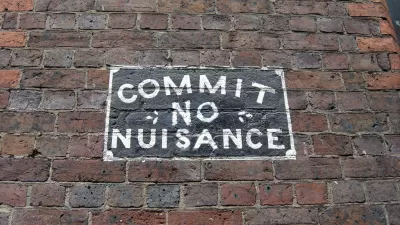David Alpert provides a thorough analysis of the first third of Washington D.C.'s proposed new zoning code, and finds a return to kind of development patterns that formed the neighborhoods residents treasure today.
According to Alpert, the Washington D.C. Office of Planning has been working to rewrite the city's archaic 1958 zoning code for four years. Now a portion of the proposed code is making its way through the public process.
The new code aims to, "correct some of the most egregious problems from the 1958 code, where it imposed social engineering ideas in vogue at the time that ended up eliminating local corner stores, pushed people out of urban neighborhoods, and forced new buildings to take a suburban form incompatible with the walkable communities that previously existed."
Alpert finds that in looking forward, the new code largely looks to traditional development patterns for major revisions such as reducing parking requirements, allowing accessory units, reducing restrictions on retail in residential areas, and easing restrictions on alley dwellings. One progressive change that Alpert highlights is a new "Green Area Ratio" for large buildings.
FULL STORY: Rewritten DC zoning code corrects past mistakes

Alabama: Trump Terminates Settlements for Black Communities Harmed By Raw Sewage
Trump deemed the landmark civil rights agreement “illegal DEI and environmental justice policy.”

Planetizen Federal Action Tracker
A weekly monitor of how Trump’s orders and actions are impacting planners and planning in America.

The 120 Year Old Tiny Home Villages That Sheltered San Francisco’s Earthquake Refugees
More than a century ago, San Francisco mobilized to house thousands of residents displaced by the 1906 earthquake. Could their strategy offer a model for the present?

Opinion: California’s SB 79 Would Improve Housing Affordability and Transit Access
A proposed bill would legalize transit-oriented development statewide.

Record Temperatures Prompt Push for Environmental Justice Bills
Nevada legislators are proposing laws that would mandate heat mitigation measures to protect residents from the impacts of extreme heat.

Downtown Pittsburgh Set to Gain 1,300 New Housing Units
Pittsburgh’s office buildings, many of which date back to the early 20th century, are prime candidates for conversion to housing.
Urban Design for Planners 1: Software Tools
This six-course series explores essential urban design concepts using open source software and equips planners with the tools they need to participate fully in the urban design process.
Planning for Universal Design
Learn the tools for implementing Universal Design in planning regulations.
Clanton & Associates, Inc.
Jessamine County Fiscal Court
Institute for Housing and Urban Development Studies (IHS)
City of Grandview
Harvard GSD Executive Education
Toledo-Lucas County Plan Commissions
Salt Lake City
NYU Wagner Graduate School of Public Service



























